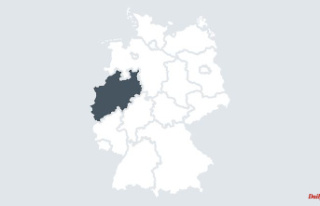The death of a cyclist in Berlin is associated with blockade actions by climate activists - a debate about a possible tightening of criminal law breaks out. Union politicians now want to pave the way for this. Traffic light politicians give reasons for their concerns.
Representatives of the traffic light coalition have opposed the Union's demands for a tightening of criminal law for climate activists. FDP General Secretary Bijan Djir-Sarai told the Tagesspiegel that he was "greatly concerned" about the "continuing radicalization of parts of the climate movement". But there are already enough legal instruments available "if the limits of peaceful protest are exceeded".
The legal policy spokeswoman for the SPD parliamentary group, Sonja Eichwede, made a similar statement. She fears a "further radicalization" of the activists. But the criminal law already offers numerous possibilities to take action against it. She called the Union's demand for tightening of criminal law "populist".
The "Bild" newspaper had reported that the Union faction wanted to introduce a bill with tightening criminal law in the Bundestag this week in response to the blockade actions and attacks on works of art by the activist group Last Generation. Road blockers who obstruct the passage of the police, fire brigade and rescue services should therefore face a minimum prison sentence in the future, and activists should be able to be arrested as a preventive measure if there is a risk of recurrence. According to the "BamS", the Union demands a minimum prison sentence for the damage or destruction of cultural assets instead of the fine that has been in force up to now.
Climate protest should "not be a license to commit crimes," said CSU regional group leader Alexander Dobrindt to the newspaper. "Significantly tougher penalties for climate chaos are needed to counteract further radicalization in parts of this climate movement and to deter imitators".
The CSU MP Andrea Lindholz, chairwoman of the interior committee in the Bundestag, told the "Welt" that the danger to people from road blockades and the damage to historical works of art "crossed red lines". The rule of law must react more harshly than before. "We will not stop the increasing radicalization with fines," warned the CSU politician.
The political and social dispute about the consequences of road blockades and other protest actions by climate activists has intensified since the death of a cyclist who was run over by a cement mixer in Berlin. The cyclist died of her injuries in hospital on Thursday. A special fire brigade vehicle was stuck in a traffic jam on Monday due to a road blockade by activists of the last generation and therefore arrived late at the scene of the accident. The Berlin police therefore filed criminal charges against two protesters, including for failure to provide assistance.












